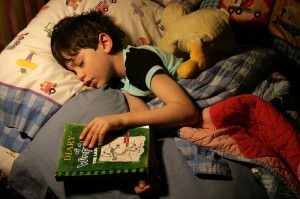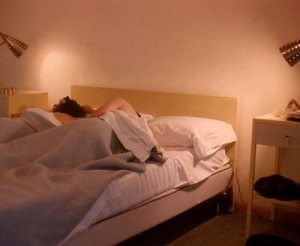

Babies cannot be able to control bladder and are therefore not considered to be wetting their beds. The age at which a baby is expected to stop wetting their beds is not clear.However, the most acceptable age a child is expected to master bladder control is anywhere between 3 and 6 years. Above this age, the child is considered to be bedwetting and is given treatment. Most physicians consider bedwetting as a sleep disorder if it happens more than twice in a week.
In general, even without treatment, cases of bedwetting tend to go down with age. Studies show that only about 20% of children aged 5 wet their bed. This is a significant decrease considering 99.9% of babies wet their beds. At age 10, only 5% of children wet their beds. Only 1-2% of adults in any population wet their beds. Enuresis as a sleeping disorder in adults usually does not resolve by itself as in children and therefore treatment needs to be administered.
Bedwetting resolves by itself in two ways as the child grows up . The child learns to recognize and respond to brain signal that tell them to wake up and empty the bladder. As the child grows, the body produces hormones that significantly reduce urine production. This way, the bladder does not fill easily at night.
Bedwetting: Types
There are two types of enuresis: primary and secondary. The primary-type is the most common and occurs when the child wet their bed everyday and do not


respond to any kind of treatment. The secondary type of bedwetting occurs after extended periods of dryness usually over six months.
Nocturnal enuresis has a very strong genetic connection. A child born to a family in which neither mother nor father wet their bed only has a 15% chance of developing the condition. On the other hand, a child born to parents who wet their beds as they grew up has a 77% chance of developing enuresis.
Other factors that lead to bedwetting at night include Urinary Tract Infections (U.T.Is) and injuries to the bladder. However, once the underlying condition is resolved, the person is able to control their bladder.
Bedwetting Remedies
There are many remedies that have been proposed for this condition. The parent can enforce positive routines to the child. The child’s fluid intake is reduced in hours leading to bet time. With no fluids in the body, the kidney does not make urine.
The so-called bedwetting alarms have been used with great success. It works by detecting fluid coming from the child’s private parts and produces a sound that wakes up the child. This way, the child learns to sense the “preferred” signal that is from the brain. On hearing the alarm sound the child wakes up and empties their bladder. If this home remedies do not work, it would be important to seek the services of a physician for more examination and advice on bedwetting solutions.
